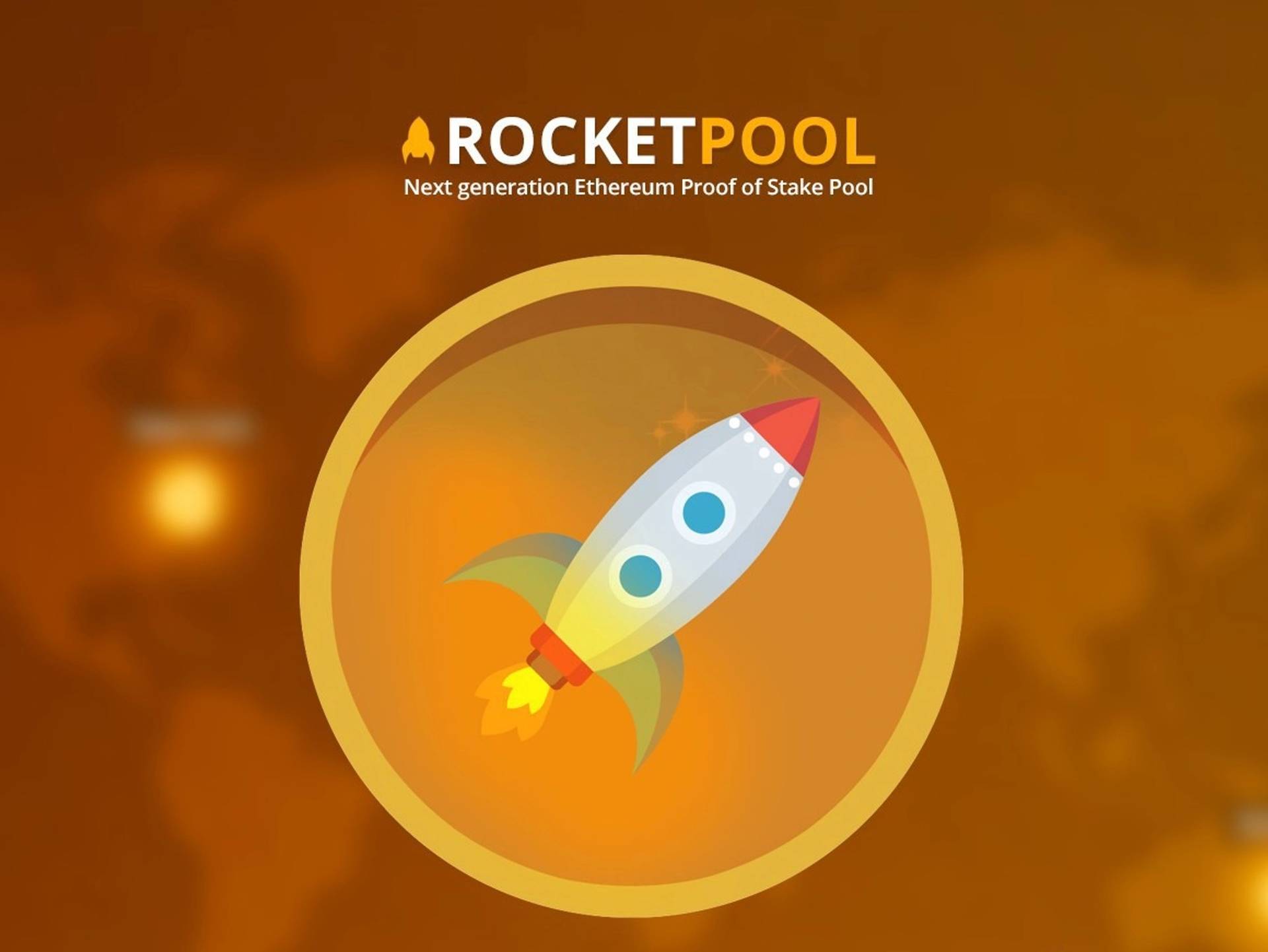Rocket Pool
Rocket Pool 是一个去中心化的 以太坊 质押平台。[1][4][5] 截至 2022 年 10 月,该协议质押了超过 292,736 个 以太币,拥有约 1,659 个节点运营商,总锁定价值 (TVL) 为 6.5011 亿美元。[8][9]
概述
Rocket Pool 提供两种以太坊质押方法:运行节点(需要至少 16 个 ETH,是以太坊独立质押所需数量的一半)或仅质押(只需要至少 0.01 ETH)。[8] Rocket Pool 的智能合约已经过 Sigma Prime、Consensys Diligence、Trail of Bits 和 Immunefi Bug Bounty 的审计。[21]
质押 + 运行节点
以太坊持有者可以使用 Rocket Pool 质押以太坊并运行节点。质押者可以通过质押赚取 ETH 奖励,并通过提供 RPL 抵押品赚取可变的 RPL 代币奖励。该解决方案是无需许可的,允许质押者通过质押 16 个以太坊来运行节点,这是独立质押以太坊所需最低数量的一半。[20]
质押
Rocket Pool 还允许以太坊持有者以低至 0.01 ETH 的数量进行质押。以太坊持有者可以存入低至 0.01 ETH 的金额,并获得 rETH 流动性质押代币。rETH 随着时间的推移会累积质押奖励。该解决方案是去中心化的,因为去中心化的节点运营商网络会为 rETH 持有者赚取奖励。该解决方案也是非托管的,因为节点运营商不处理资金。节点运营商产生的任何处罚都从他们的收入中扣除,而不是从 rETH 持有者那里扣除。[20]
RPL 代币
RPL 是 Rocket Pool 的原生代币,总供应量为 18,000,000。它确保系统保持无需信任和去中心化,并且社区可以管理其运作方式。作为一种保险形式,RPL 也可以在 Rocket Pool 节点上进行质押。
由于运营商质押 RPL,他们还会收到相同代币的额外奖励。这是通过管理的通货膨胀产生的。运营商可以质押高达质押 ETH 价值的 150%。每 28 天铸造新的 RPL 代币;这个周期称为“检查点”。RPL 分发给节点运营商,以换取在网络上运行。根据 Rocket Pool 的说法,它有目的地管理 RPL 代币 5% 的通货膨胀率。[13]
2021 年 11 月,发布了一个新的 Rocket Pool 协议代币,可以使用 Rocket Pool 质押网站迁移旧的 Rocket Pool 代币。[19]
代币分配
| 序号 | 分配 | (%) | 数量 |
|---|---|---|---|
| 1. | 创始人与项目 | 15% | 2,700,000 |
| 2. | 投资者 | 54% | 9,720,000 |
| 3. | 预挖奖励与空投 | 31% | 5,580,000 |
rETH
Rocket Pool ETH (rETH) 是该协议的流动性质押代币。rETH 代币代表正在质押并在 以太坊 权益证明 中赚取奖励的 ETH 数量。随着 Rocket Pool 节点运营商进行质押,由此产生的奖励会增加 rETH 相对于 ETH 的价值。[19]
启动
Rocket Pool 于 2021 年 11 月首次在以太坊主网上启动,当时信标链是一条与以太坊工作量证明主链并行运行的独立链。后来,在合并之后,Rocket Pool 成为与 以太坊 中质押兼容的 以太坊 权益证明 (PoS) 基础设施服务。该团队最初计划于 10 月 6 日发布,但由于发现了一个 ETH2 质押问题而决定推迟发布。这个问题是通过他们的漏洞赏金计划发现的,如果当时发布,不仅会影响 Rocket Pool,还会影响几个实时质押平台。[14] 在运营的头两天,Rocket Pool 在全球 42 个地点注册了 237 个节点运营商,质押了 1,088 个 ETH。[7]
主网发布
Rocket Pool 主网的发布是一个分阶段的发布,逐步增加协议的总质押价值。发布分 4 个短到中等长度的阶段进行。每个阶段都限制了最小池的数量和 rETH 存款池的大小。一旦达到最小池限制,新的节点运营商将无法存款,直到下一个阶段。一旦 rETH 存款池达到其限制,质押者将无法将 ETH 兑换为 rETH,直到下一个阶段。
红石
红石是 Rocket Pool 发布的名称,其中包括合并兼容性。红石智能节点和智能合约发布发生在 以太坊 合并之前。[17]
优先级费用分配器
合并后,智能节点运营商及其最小池验证器开始负责创建区块,并且在这样做时,他们开始收到附加到每个交易的优先级费用(也称为小费)。这个新的分配器确保这些费用在节点运营商和 rETH 流动性质押用户之间分配,就像之前的信标链奖励一样。[18]
奖励系统
Rocket Pool 协议中的节点运营商之前需要质押 RPL 作为对协议的保险承诺。如果他们受到严重的处罚,那么他们的 RPL 质押将被处罚。质押此 RPL 的节点运营商也会每 28 天从协议中获得奖励,以提供此保险。通过合并,节点必须每 28 天进行一次链上声明,并且 gas 费用取决于以太坊网络在进行声明时的繁忙程度。[18]
平滑池
新的平滑池是一个选择加入的功能,它集体汇集了每个选择加入它的成员的优先级费用。这是一种有效消除与信标链上的区块提议相关的随机性的方法。[18]
协议 DAO (PDAO)
Rocket Pool 协议 DAO 负责协议中的一系列设置,并由 RPL 治理运行。协议 DAO 可以提出和支持治理提案,确定如何花费 PDAO 金库,并可能更改某些协议设置。对于第 0 阶段,PDAO 将没有直接的链上权力。这是为了限制治理权力,直到它足够稳定以进行控制。核心团队将在 PDAO 的要求下影响这种权力。[15][16]
预言机 DAO (ODAO)
Rocket Pool 协议有两种类型的节点:常规绑定节点和预言机节点。这些节点运营商组成了预言机 DAO。预言机 DAO 是协议中特殊节点的去中心化网络,它在一个专为 Rocket Pool 创建的真正的链上 DAO 中运行。这个 DAO 的成员可以创建提案来邀请新成员、离开 DAO、从协议的代币经济学中赚取 RPL 等等。这些节点在将 ETH2 上信标链的信息中继到 ETH1 上 Rocket Pool 的智能合约中起着至关重要的作用。[12]
启动成员
- 灯塔 (Lighthouse)
- Nimbus
- Prysmatic Labs
- Etherscan & Beaconscan
- Beaconcha.in
- ConsenSys Codefi
- Blockdaemon
- Staked
- Blockchain Capital
- Bankless
- Ethstakers
- Fire Eyes
- CryptoManufaktur
- Rocket Pool[14]
团队
- David Rugendyke - 创始人兼首席技术官
- Darren Langley - 总经理
- Kane Wallmann - 高级 Solidity 工程师
- Nick Doherty - 高级区块链工程师
- Joe Clapis - 高级区块链工程师
- Maverick (Nick Ashley) - 营销与社区经理
